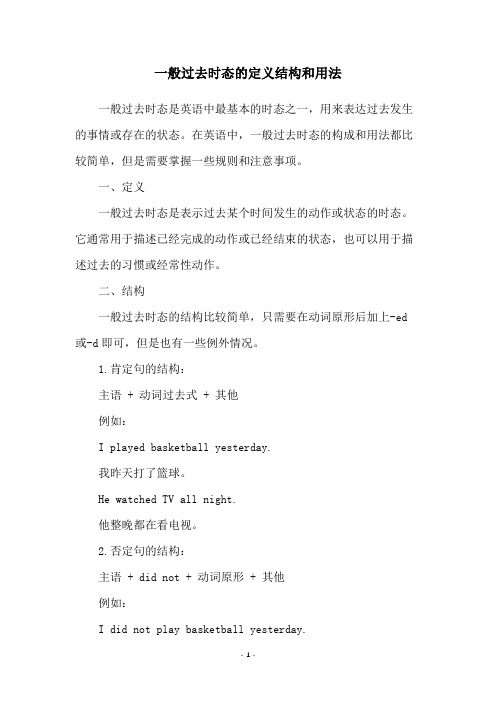一般过去时用法及结构
一般过去时的用法及结构

一般过去时的用法及结构1.一般过去时的基本用法一般过去时表示过去某个时间发生的动作或存在的状态,也可表过去经常或反复发生的动作。
常和过去的时间状语连用,如yesterday, last week, last night, in 2003, two days ago等。
【举例】I _____________________ at 6:30 yesterday. 我昨天6:30起床。
My father____________ very busy last week. 我父亲上周很忙。
2.一般过去时的基本结构⑴肯定句“主语+动词过去式+其他”或者“主语+wa s/were+其他”。
【举例】I _____________ tennis last weekend. 我上周末打网球了。
⑵否定句“主语+didn’t+动词原形+其他”或“主语+wasn’t/were n’t+其他”。
The girl _____ _____ computer games yesterday afternoon. 这个女孩昨天下午没玩电子游戏。
Old Henry _______ happy last Friday. 上星期五老亨利不高兴。
⑶一般疑问句“Did+主语+动词原形+其他?”肯定回答为“Yes,主语+did”,否定回答为“No,主语+didn’t”或者“Was/Were+主语+其他?”肯定回答为“Yes,主语+wa s /were”,否定回答为“No,主语+wasn’t/were n’t”。
【举例】—Did you go to the beach? 你们去海滩了吗?—Yes, we did./No, we did n’t. 是的,我们去了。
/不,我们没有。
—Was your weekend OK? 你的周末过得还行吧?—Yes, it was./No, it wasn’t. 是的,还行。
/不,不行。
⑷特殊疑问句:特殊疑问词+一般疑问句(顺序)?【举例】—What _______Li Lei __________ last weekend? 李雷上周末干什么了?—He _____________ his grandparents. 他去看了他的祖父母。
一般过去时规则及例子

一般过去时规则及例子
一般过去时表示过去某个时间里发生的动作或状态;过去习惯性、经常性的动作、行为;过去主语所具备的能力和性格。
基本结构:主语+谓语(动词过去式)+句子其他成分;主语+was/were+形容词/名词/介词短语+过去时间;否定形式①was/were+not;②在行为动词前加didn't,同时还原行为动词;一般疑问句Did+主语+do+其他。
一般过去时,表示过去某个时间里发生的非持续性动作或存在的状态,也表示经常或反复发生的动作。
用动词的过去式表示,常和表示过去的时间状语连用,例如:yesterday,last night,in+过去的年份,two days ago,before,the age of,the day before yesterday 等。
一般过去时也表示过去经常或反复发生的动作,常和often,always 等表示频率的时间状语连用。
表示过去习惯性、经常性的动作、行为;过去主语所具备的能力和性格。
一般过去时态的定义结构和用法

一般过去时态的定义结构和用法一般过去时态是英语中最基本的时态之一,用来表达过去发生的事情或存在的状态。
在英语中,一般过去时态的构成和用法都比较简单,但是需要掌握一些规则和注意事项。
一、定义一般过去时态是表示过去某个时间发生的动作或状态的时态。
它通常用于描述已经完成的动作或已经结束的状态,也可以用于描述过去的习惯或经常性动作。
二、结构一般过去时态的结构比较简单,只需要在动词原形后加上-ed 或-d即可,但是也有一些例外情况。
1.肯定句的结构:主语 + 动词过去式 + 其他例如:I played basketball yesterday.我昨天打了篮球。
He watched TV all night.他整晚都在看电视。
2.否定句的结构:主语 + did not + 动词原形 + 其他例如:I did not play basketball yesterday.我昨天没有打篮球。
He did not watch TV all night.他整晚都没有看电视。
3.疑问句的结构:Did + 主语 + 动词原形 + 其他?例如:Did you play basketball yesterday?你昨天打篮球了吗?Did he watch TV all night?他整晚都在看电视吗?4.特殊情况:有些动词的过去式并不是加-ed或-d,需要特别记忆,例如:go → wentcome → camesee → saweat → ate三、用法一般过去时态的用法比较广泛,主要包括以下几个方面:1.表示过去的动作或状态例如:I visited my grandparents last week.我上个星期去看了我的祖父母。
She was very happy when she got the news.她得知这个消息时非常开心。
2.表示过去的经常性动作或习惯例如:When I was a child, I always played with my friends after school.当我还是个孩子的时候,放学后我总是和我的朋友一起玩。
一般过去时的用法及结构

一般过去时的用法及结构1.表示过去的习惯或经常性的动作:- Every day, he walked to school. (每天他步行去上学。
)- She often played the piano in the evening. (她经常在晚上弹钢琴。
)- They always visited their grandparents on Sundays. (他们每个星期天总是去看望他们的祖父母。
)2.表示过去具体的、已经完成的动作:- I finished my homework last night. (昨晚我完成了我的作业。
) - He went to the cinema yesterday. (他昨天去了电影院。
)- She cooked a delicious dinner for us. (她为我们做了一顿美味的晚餐。
)3.表示过去进行的动作:- They were playing football in the park. (他们正在公园里踢足球。
)- She was reading a book on the sofa. (她正坐在沙发上读书。
)4.表示过去存在的状态或属性:- It was a sunny day yesterday. (昨天是个晴朗的日子。
)- The house was old and small. (这房子又旧又小。
)- He was happy when he heard the good news. (当他听到那个好消息时他很高兴。
)5.在宾语从句中,表示间接引语的动作或说话:- He said he loved me. (他说他爱我。
)- She told us she was going to travel. (她告诉我们她要去旅行。
)- They asked if I had seen the movie. (他们问我是否看过那部电影。
)需要注意的是,一般过去时经常与表示过去的时间状语连用,如yesterday(昨天)、last night(昨晚)、two years ago(两年前)等。
一般过去时的用法

一般过去时一、一般过去时的基本用法一般过去时表示过去某一时候或某一段时间所发生了的事情或存在的状态,常与过去时间状语连用。
二、一般过去时的时间状语①与yesterday连用的时间,例如,yesterday,yesterday evening,the day before yesterday,等②与last连用的时间,即last+时间,例如last night, last week③与ago连用的时间,即时间+ago,例如 a moment ago.three days ago④in+过去时间,例如in 1998, in 2000⑤表示过去的时间just now,this morning, once upon a time,the other day,at the age of+过去的年龄,at that time, at that moment等三、一般过去时的结构1、肯定形式:① be动词:主语+was/were+其他eg:i was very busy yesterday.②行为动词:主语+动词过去式+其他eg:i played football yesterday.2、否定形式:①主语+was/were+not+其他eg:i was not busy yesterday.②主语+didn’t+动词原形+其他eg:i didn’t play football yesterday.3、一般疑问句:① was/were+主语+其他?eg: were you busy yesterday?② Did +主语+动词原形+其他? eg: did you play football yesterday?4、特殊疑问句:特殊疑问词+一般疑问句四、动词过去时动词变化规则。
一般过去时用法及结构

一般过去时用法及结构1、一般过去时的用法及结构1.一般过去时的基本用法一般过去时表示过去某个时间发生的动作或存在的状态,也可表示过去常常或反复发生的动作。
常和表示过去的时间状语连用,如yesterday, last week, last night, in 2021, two days ago等。
【举例】I got up at 6:30 yesterday. 我昨天6:30起床。
My father was very busy last week. 我父亲上周很忙。
2.一般过去时的基本结构⑴确定句“主语+动词过去式+其他”或者“主语+was/were+其他”。
【举例2、】I played tennis last weekend. 我上周末打网球了。
My school trip was great. 我的学校郊游棒极了。
⑵否认句“主语+didn’t+动词原形+其他”或“主语+wasn’t/weren’t+其他”。
【举例】The girl didn’t play computer games yesterday afternoon . 这个女孩昨天下午没玩电子游戏。
Old Henry wasn’t happy last Friday. 上星期五老亨利不高兴。
⑶一般疑问句“Did+主语+动词原形+其他?”确定回答3、为“Yes,主语+did”,否认回答为“No,主语+didn’t”或者“Was /Were+主语+其他?”确定回答为“Yes,主语+was/were”,否认回答为“No,主语+wasn’t/weren’t”。
【举例】—Did you go to the beach? 你们去海滩了吗?—Yes, we did./No, we didn’t.是的,我们去了。
/不,我们没有。
—Was your weekend OK? 你的周末过得还行吧?—Yes, it was./No, it wasn’t.是的,还行。
一般过去时用法和结构
一般过去时用法和结构一般过去时,那可真是英语时态里的一个“小机灵鬼”呢!一般过去时就是用来描述过去某个时间里发生的动作或者状态。
比如说,I went to the park yesterday.(我昨天去公园了)。
这里的“went”就是“go”的一般过去式,很明显是发生在昨天这个过去的时间里的动作。
在结构上呀,如果是be动词,那就是主语+was/were+其他。
像He was at home last night.(他昨晚在家)。
要是实义动词呢,就是主语+动词的过去式+其他。
就像She played basketball last week.(她上周打篮球了)。
动词的过去式可有意思啦,有些是规则变化,就像直接加 -ed 的,像work变成worked;还有以e结尾的直接加 -d,比如like 变成liked。
但也有调皮的不规则变化,像go变成went,eat变成ate。
这就像是每个动词都有自己独特的小脾气一样。
我们在日常生活里经常会用到一般过去时呢。
当你和朋友聊天,说I saw a really cute dog on my way to school this morning.(我今天早上上学路上看到一只超可爱的狗),这就是在分享过去发生的事情呀。
又或者当你在讲述自己的经历,比如I visited my grandparents last month.(我上个月去看望我的爷爷奶奶了)。
它就像是一把钥匙,能打开我们过去的记忆盒子,把那些有趣的、难忘的事情分享出来。
而且在故事里,一般过去时也是常客。
比如The little boy ran away from home yesterday.(小男孩昨天离家出走了),这一下子就能把我们带入到故事的情节当中去。
我们在学英语的时候,可不能小瞧一般过去时哦。
要是用错了,那可就像把衣服穿反了一样别扭。
它能让我们准确地传达过去的信息,让别人能清楚地了解我们想要分享的过去的事情。
6一般过去时的用法及结构
一般过去时1.一般过去时的基本用法一般过去时表示过去某个时间发生的动作或存在的状态。
常和表示过去的时间状语连用,如yesterday, last week, last night, in 2003, two days ago等。
【举例】I got up at 6:30 yesterday. 我昨天6:30起床。
My father was very busy last week. 我父亲上周很忙。
2.一般过去时的基本结构⑴肯定句“主语+动词过去式+其他”或者“主语+wa s/were+其他”。
【举例】I played basketball last weekend. 。
My school trip was great.⑵否定句“主语+didn’t+动词原形+其他”或“主语+wasn’t/were n’t+其他”。
【举例】The girl didn’t play computer games yesterday afternoon .Bob wasn’t happy last Friday.⑶一般疑问句“Did+主语+动词原形+其他?”肯定回答为“Yes,主语+did”,否定回答为“No,主语+didn’t”或者“Was/Were+主语+其他?”肯定回答为“Yes,主语+wa s/were”,否定回答为“No,主语+wasn’t/were n’t”。
【举例】—Did you go to the beach? \—Yes, we did./No, we did n’t. \—Was your weekend OK? \—Yes, it was./No, it wasn’t. \⑷特殊疑问句:特殊疑问词+一般疑问句(顺序)?【举例】—What did Li Lei do last weekend?—He visited his grandparents.——Where were you yesterday?——I was at home.过去式的构成be动词和实义动词过去式的构成:⑴系动词be 的过去式有两种形式:was 和were。
一般过去时态的结构和用法表格
以下是一般过去时态的结构和用法的表格:结构用法
基本结构主语 + 动词过去式 + 宾语(如果有的话)
动词过去式动词的过去式是动词的基本形式加上-ed或-d,具体形式取决于动词的词性。
例如,动词write的过去式是wrote。
时间状语一般过去时态通常与表示过去的时间状语连用,如yesterday(昨天)、last night(昨晚)、two days ago(两天前)等。
否定句在一般过去时态的否定句中,通常在动词过去式前加上助动词didn't或didn't not。
例如,I didn't go to the park yesterday.(我昨天没有去公
园。
)
疑问句一般过去时态的疑问句通常以Did开头,后面跟上主语和动词过去式。
例如,Did you go to the park yesterday?(你昨天去公园了吗?)
特殊用法一般过去时态还可以表示过去某个时间点的状态或习惯性行为。
例如,He used to smoke a lot.(他过去常常抽
很多烟。
)
请注意,以上表格提供了一般过去时态的基本结构和用法,但具体用法可能因语境和句子结构而有所不同。
一般过去时的用法及结构笔记
一般过去时的用法及结构笔记(实用版)目录I.一般过去时简介1.时间含义2.结构特点II.一般过去时的结构1.动词变化规则2.其他语法规则III.一般过去时在句子中的使用1.陈述句2.疑问句3.否定句IV.一般过去时与其它时态的比较1.现在完成时2.过去完成时3.将来时正文一、一般过去时简介一般过去时是一种表示过去某个时间点发生过的事情的时态。
它强调的是过去某个时间点,而非持续性的动作或状态。
在中文中,一般过去时通常使用“了”来表示。
例如,“我昨天去了公园。
”这句话就使用了“了”来表示发生在昨天的一个动作。
二、一般过去时的结构一般过去时的结构包括动词的变化和其他语法规则。
1.动词变化规则:一般过去时通常使用动词原形,没有加-ed或-ing 的形式。
例如,“I walked to school yesterday.”中的“walked”就是动词原形,没有加-ed的形式。
2.其他语法规则:一般过去时还涉及到一些其他的语法规则,例如时间状语的用法、否定句和疑问句的构造等。
例如,“I didn"t watch the movie yesterday.”中的“watch”是动词,没有加-ed的形式,表示在过去某个时间点发生的一个动作。
三、一般过去时在句子中的使用一般过去时在句子中可以用来表达陈述、疑问、否定等含义。
例如,“I had a great time yesterday.”这句话就是一个陈述句,表示“我”在过去某个时间点度过了一段美好的时光。
而“Did you watch the game yesterday?”则是一个疑问句,表示“你”是否观看了比赛。
而“I didn"t finish my homework.”则是一个否定句,表示“我”没有完成作业。
四、一般过去时与其它时态的比较一般过去时与其它时态相比较,有以下几种比较:1.与现在完成时比较:现在完成时强调的是过去的动作对现在造成的影响和结果,而一般过去时则没有这个含义。
- 1、下载文档前请自行甄别文档内容的完整性,平台不提供额外的编辑、内容补充、找答案等附加服务。
- 2、"仅部分预览"的文档,不可在线预览部分如存在完整性等问题,可反馈申请退款(可完整预览的文档不适用该条件!)。
- 3、如文档侵犯您的权益,请联系客服反馈,我们会尽快为您处理(人工客服工作时间:9:00-18:30)。
一般过去时的用法及结构1.一般过去时的基本用法一般过去时表示过去某个时间发生的动作或存在的状态,也可表示过去经常或反复发生的动作。
常和表示过去的时间状语连用,如yesterday,last week,last night,in2003,two days ago 等。
【举例】I got up at6:30yesterday.我昨天6:30起床。
My father was very busy last week.我父亲上周很忙。
2.一般过去时的基本结构⑴肯定句“主语+动词过去式+其他”或者“主语+was/were+其他”。
【举例】I played tennis last weekend.我上周末打网球了。
My school trip was great.我的学校郊游棒极了。
⑵否定句“主语+didn’t+动词原形+其他”或“主语+wasn’t/weren’t+其他”。
【举例】The girl didn’t play computer games yesterday afternoon.这个女孩昨天下午没玩电子游戏。
Old Henry wasn’t happy last Friday.上星期五老亨利不高兴。
⑶一般疑问句“Did+主语+动词原形+其他?”肯定回答为“Yes,主语+did”,否定回答为“No,主语+didn’t”或者“Was/Were+主语+其他?”肯定回答为“Yes,主语+was/were”,否定回答为“No,主语+wasn’t/weren’t”。
【举例】—Did you go to the beach?你们去海滩了吗?—Yes,we did./No,we didn’t.是的,我们去了。
/不,我们没有。
—Was your weekend OK?你的周末过得还行吧?—Yes,it was./No,it wasn’t.是的,还行。
/不,不行。
⑷特殊疑问句:特殊疑问词+一般疑问句(顺序)?【举例】—What did Li Lei do last weekend?雷上周末干什么了?—He visited his grandparents.他去看了他的祖父母。
—Where were you yesterday?你昨天在哪儿?—I was at home.我在家里。
为了便于记忆行为动词(实义动词)的一般过去时用法及结构,我们可用以下歌诀来帮助记忆:动词一般过去时,表示过去发生事。
谓语动词过去式,过去时间作标志。
否定形式很简单,主语之后didn’t添。
谓语动词要还原。
疑问构成有规则,主语前面加did。
过去式的构成be动词和实义动词过去式的构成:⑴系动词be的过去式有两种形式:was和were。
其中was是am和is的过去式,were是are的过去式。
⑵规则动词过去式的构成:①一般在动词末尾加—ed。
【举例】walk→walked play→played②以不发音e结尾的动词末尾只加—d。
【举例】love→loved decide→decided③结尾是“辅音字母+y”的动词。
先将y变为i,再加—ed。
【举例】study→studied carry →carried④末尾只有一个辅音字母的重读闭音节,先双写该辅音字母,再加—ed。
【举例】stop→stopped plan→planned规则动词的过去式构成方法可用以下口诀来记忆:过去式构成有规律,一般词尾加—ed如果词尾有个e(不发音的),只需直接加上—d。
“辅音字母+y”在词尾,变y为i加—ed。
“一辅重闭”作尾巴,双写之后加—ed。
随堂练习:一.写出下列动词的过去式。
1.am/is________2.do_______3.go________4.have_______5.isn’t_________6.aren’t________7.spend________8.cook_______9.read________10.clean_______11.live_______12.study_________二.用适当的词完成下列对话。
1.—How was your weekend?—It______great.—What_______you______last weekend?—I_______some homework.2.—What______she______last weekend?—She_______to the beach.3.—What_______they do last weekend?—They________to the movies.三.用括号所给词的适当形式填空。
1.We_________(enjoy)ourselves at the party last night.2.Jack____________(study)for the English test last Sunday.3._______you______(go)to the Great Wall last year?4.What day_______(be)it yesterday?5.The old man_______(be)ill and went to see a doctor.6.We________(have)a party last night.7.We__________(visit)the museum and went home.8.—How_______(be)the students?—They were very friendly.9.He often_______(have)supper at home.Today he______(have)supper at school.10.We had great fun_______(play)in the water.11.That made me______(feel)very happy.12.—______he_______(have)lunch at nine?—No,he didn’t.13.They_________(buy)a guitar yesterday.四.句型转换。
1.He came here last month.(改为否定句)He______________here last month.2..They played football this morning.(改为一般疑问句并作简略回答)—______they_______football this morning?—Yes,they_______./No,they_________.3.They went to Beijing last year.(就划线部分提问)__________________they________last year.4.Tom watched TV last night.(改为一般疑问句)_______Tom_______TV last night?5.Mary does homework every day.(用last night改写句子)Mary_____________________________________.一般现在时的用法与结构1、一般现在时的定义及构成一般现在时表示现在经常反复发生的动作、存在的状态或习惯性的动作。
(1)be(am,is,are)动词:(作谓语动词时)肯定句:主语+be动词(am,is,are)+其它。
如:①I am a student.(主语+be动词+名词)②They are hungry.(主语+be动词+形容词)③He is out.(主语+be动词+副词)④That pen is mine.(主语+be动词+代词)⑤I am fifteen.(主语+be动词+数词)⑥The bike is under the tree.(主语+be动词+介词短语)运用am,is,are写三个句子否定句:主语+be(am,is,are)+not+其它。
如:He is not a worker.他不是工人。
运用am,is,are写三个句子一般疑问句:Be(am,is,are)+主语+其它。
如:-Are you a student?-Yes.I am./No,I'm not.运用am,is,are写三个句子特殊疑问句:疑问词+一般疑问句。
如:Where is my bike?运用am,is,are写三个句子特殊疑问句:疑问词(what,where,who,when,which,whose,how,how many,how much,what shape, what colour,),找句子中有没有be动词(is,am或者are)或情态动词或者助动词(特殊疑问句:疑问词+be动词(is,am或者are)或情态动词或者助动词+其他?)(2)行为动词:主语+行为动词+(其它)。
(作谓语动词时)1)主语不是第三人称单数时,肯定句为:主语+动词原形+其它否定式为:主语+don't+动词原形+其它疑问句为:Do+主语+动词原形+其它?e.g.①We speak Chinese.②Do you speak Chinese?---Yes,I do./No,I don't.③They don't speak Chinese.写三个句子2)当主语是第三人称单数时:(he,she,it,A/An,单独的人或事物:Lily/book)肯定句为:主语+动词(词尾加s或es)+其它。
否定式为:主语+doesn't+动词原形+其它.疑问句式:Does+主语+动词原形+其它?①He speaks English.②He doesn't speaks English.③-Does she go to work by bike?Yes,she does./No,she doesn't.写三个句子特殊疑问句:疑问词+一般疑问句。
如:How does your father go to work?3)动词+s的变化规则(1)一般情况下,直接加-s,如:cook-cooks,milk-milks(2)以s.x.sh.ch.o结尾,加-es,如:guess-guesses,wash-washes,watch-watches,go-goes(3)以"辅音字母+y"结尾,变y为i,再加-es,如:study-studies(3)情态动词(作谓语动词时)(can,could,be able to,may,might,must,have to,need,shall,should, will,would)时,句子结构为:肯定句:主语+情态动词+动词原形。
